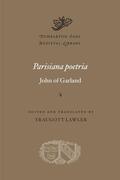
The Parisiana poetria, first published around 1220, expounds the medieval theory of poetry (ars poetica) and summarizes early thirteenth-century thought about writing. While the text draws on predecessors such as the Rhetorica ad Herennium, Horace’s Ars Poetica, and work by Geoffrey of Vinsauf, its style and content reveal the unique experience of its author, John of Garland, a prominent teacher of the language arts at the University of Paris. John was also a well-read poet with broad tastes, and his passion for poetry, as well as for fine prose composition, is on display throughout the Parisiana poetria. This treatise is the only thoroughgoing attempt to unite three distinct arts—quantitative poetry, rhythmic poetry, and prose composition, especially of letters—under a single set of rules. The sections on low, middle, and high style, illustrated by his “Wheel of Virgil,” have attracted wide attention; and his long account of rhymed poetry is the most complete that has survived. This volume presents the most authoritative edition of the Latin text alongside a fresh English translation.